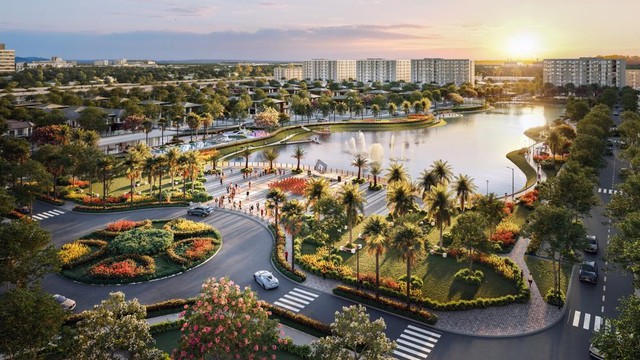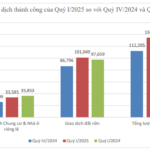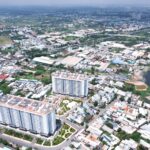Unprecedented Investment in Multimodal Transportation Infrastructure
Once a predominantly river-based and inward-looking urban area, Can Tho is now transforming into a vital connectivity hub for the entire Mekong Delta region. A series of “historical infrastructure” projects, including synchronized investments in road, rail, waterway, and seaport infrastructure, are reshaping the region’s landscape, fostering socio-economic development, and laying the foundation for the city’s future growth.
In the development strategy for the Mekong Delta region for the period of 2021–2030, with a vision towards 2050, Can Tho has been designated as the transportation hub and driving force for the entire region’s development. This strategy is materialized through a range of large-scale infrastructure projects currently being implemented at an unprecedented pace. The formation of key transportation links is opening up comprehensive connectivity opportunities for Can Tho and the surrounding areas.
Firstly, the Can Tho – Ca Mau expressway, spanning 111 kilometers with a total investment of over VND 27.5 trillion, is expected to be completed by December 2025. This route will significantly reduce travel time between Can Tho and the southernmost provinces, boosting inter-regional trade and transportation. Following this is the Chau Doc – Can Tho – Soc Trang expressway, measuring 188.2 kilometers in length, which began construction in June 2023 and aims for completion by July 2026. This project will further propel the development of the entire Mekong Delta region.
Additionally, the Nam Song Hau road, a vital transportation artery connecting Can Tho to Soc Trang, will undergo upgrades in 2025, enhancing both road and waterway transportation capacity. Furthermore, Can Tho is poised for a significant leap forward with the upcoming construction of the Ho Chi Minh City – Can Tho railway, slated to begin in 2027. This modern 174-kilometer railway will reduce travel time between the two economic centers to just about two hours. Subsequently, the Can Tho – Ca Mau railway project, expected to commence in 2028, will complete the transportation network linking the western provinces with the southeastern economic belt.
Recently, the Can Tho People’s Council approved a proposal to merge Hau Giang and Soc Trang provinces into the city of Can Tho, forming a centrally-governed city with a population of over four million. Notably, with this proposal, Can Tho will possess a 72-kilometer coastline, facilitating the planning of a comprehensive transportation network connecting the inland areas to the sea. Among these plans, the Tran De deep-sea port project stands out as the focal point of all near-future economic development strategies centered on maritime activities.
Overall, these infrastructure developments will establish Can Tho as the region’s hub for trade, logistics, and industry, as well as a highly attractive investment destination in the Mekong Delta in the coming years.
Can Tho’s Real Estate Market on the Verge of Taking Off
The development of infrastructure serves as a crucial catalyst for the transformation of Can Tho’s real estate market. Improved regional connectivity not only benefits the local economy but also ushers in a new cycle of growth for the real estate sector, especially in central areas. The real estate market trends in centrally-governed cities like Ho Chi Minh City and Hanoi demonstrate that areas with large-scale infrastructure investments, including belt roads, metro lines, or expressways, have witnessed property values surge by 30–70% within just a few years. Can Tho, with its unprecedented wave of infrastructure development, is poised to become the new star on the southern Vietnam investment map.

Nam Long II Central Lake promises to be a compelling investment and residential destination
In this context, Cai Rang and Ninh Kieu districts, the administrative, service, and commercial centers of Can Tho, stand out as areas with exceptional potential due to their prime locations and convenient access to expressways, national highways, and seaports.
One notable project in this region is the Nam Long II Central Lake urban area, developed by Nam Long. Strategically located adjacent to the Nam Song Hau road and offering seamless connectivity to major transportation arteries such as National Highways QL1A and QL91B, and the Can Tho – Ca Mau expressway, this project is positioned to reap the benefits of the new infrastructure developments.
Spanning over 43 hectares, Nam Long II Central Lake is designed as an integrated urban area featuring a comprehensive range of amenities, including educational institutions, commercial services, healthcare facilities, and community spaces. A host of amenities, such as a 3-hectare central park, clubhouse, sports facilities, and outdoor playgrounds, are already in place to cater to the recreational needs of the community.

Nam Long II Central Lake is designed as an integrated urban area with modern amenities
Backed by Nam Long, a reputable developer with 33 years of experience in urban development in Vietnam, the Nam Long II Central Lake project offers transparent legal procedures, clear property rights, and sustainable value growth based on a long-term urban development strategy.
According to experts, the billion-dollar infrastructure projects underway in Can Tho represent an unprecedented boost for the region, completing the local transportation network and fostering socio-economic development in the “land of nine dragons.” This serves as a crucial launchpad for the real estate market to soar. Key projects like Nam Long II Central Lake are poised to become attractive destinations for both investors and homebuyers in the coming years.
“Local Land Prices Surge in Several Northern Provinces: A Focus on Northern Vietnam’s Real Estate Boom”
The Ministry of Construction reports that in provinces rumored to be the site of new administrative centers, land prices have soared and transaction volumes have shown an upward trend.
Sowatco’s Astonishing Move: A 35% Cash Dividend Surprise!
The Southern Waterway Joint Stock Company (Sowatco), trading on the UPCoM exchange under the ticker SWC, has announced a substantial dividend payout for 2024. The company’s Annual General Meeting approved a cash dividend of up to 35% of charter capital, equivalent to VND 3,500 per share. This significant payout marks a notable increase from the previously intended plan of not distributing dividends.





















